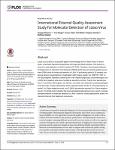International External Quality Assessment Study for Molecular Detection of Lassa Virus
Nikisins, Sergejs
Rieger, Toni
Patel, Pranav
Müller, Rolf
Günther, Stephan
Niedrig, Matthias
Lassa virus (LASV) is a causative agent of hemorrhagic fever in West Africa. In recent years, it has been imported several times to Europe and North America. The method of choice for early detection of LASV in blood is RT-PCR. Therefore, the European Network for Diagnostics of ‘Imported’ Viral Diseases (ENIVD) performed an external quality assessment (EQA) study for molecular detection of LASV. A proficiency panel of 13 samples containing various concentrations of inactivated LASV strains Josiah, Lib-1580/121, CSF, or AV was prepared. Samples containing the LASV-related lymphocytic choriomeningitis virus (LCMV) and negative sera were included as specificity controls. Twenty-four laboratories from 17 countries (13 European, one African, one Asian, two American countries) participated in the study. Thirteen laboratories (54%) reported correct results, 4 (17%) laboratories reported 1 to 2 false-negative results, and 7 (29%) laboratories reported 3 to 5 false-negative results. This EQA study indicates that most participating laboratories have a good or acceptable performance in molecular detection of LASV. However, several laboratories need to review and improve their diagnostic procedures.
No license information

